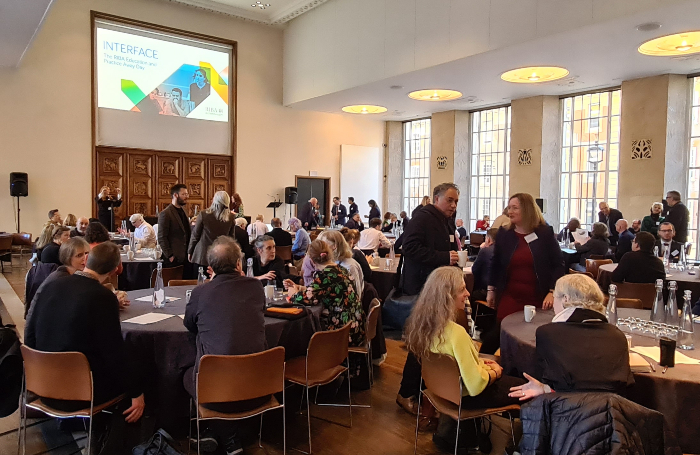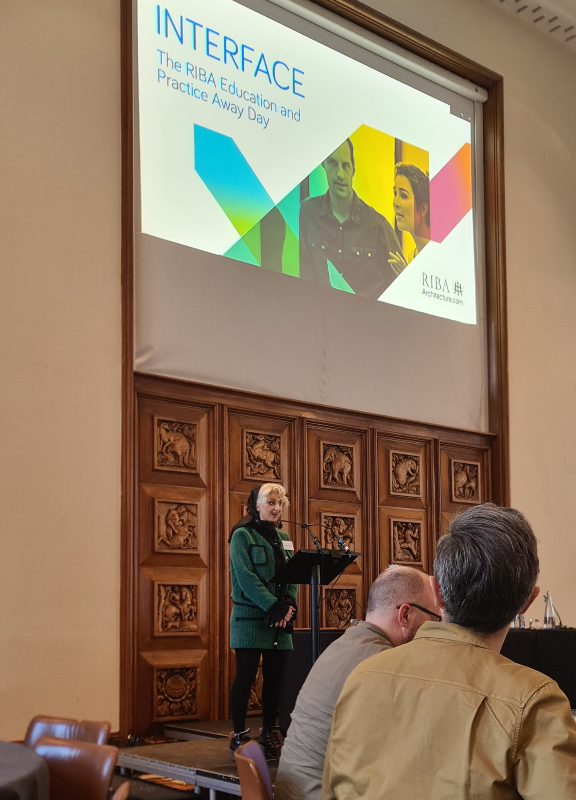On 18 January 2023, the RIBA Education and Practice teams gathered voices from across the sector to consider concerns and insights about the interface between architecture education and practice.
People from across the industry attended, including students, academics, practitioners, policy makers and those from associated professions, along with RIBA Council, Board and staff members. Each session was led by short presentations and followed by roundtable discussions, concluding in feedback and debate, enabling new ideas to emerge together and connections to be formed.
On 11 January, RIBA had released the Education White Paper and Adrian Dobson presented the key aspects to attendees. The White Paper preceded the release of the ARB’s Tomorrows Architect’ consultation on Education Reform, currently open until 10 May and forming a focus point over the coming months for the RIBA.

Key discussion points:
PRACTICE FOCUS - What does Architectural Practice need from Architectural Education?
- How is today’s architectural education relevant to today’s architectural practice?
Albena Atanassova (Scott Brownrigg) questioned the value of architectural education, highlighting that the average architect’s salary doesn’t equate to the required years of study when compared to other professions. She also evidenced data showing that between 2012 and 2019, most complaints reported to the ARB concerned a lack of soft skills, in particular, project management and failing to understand the commercial imperatives of design and construction.
- Work-based Learning Models
As Director of Collaborative Practice at the University of Sheffield, Satwinder Samra discussed the importance of work-based educational models, citing the length, cost and arduous nature of architecture education.
- What does practice need in order to better support education?
Harbinder Birdi of Birdi & Partners and former Head of Infrastructure at Hawkins Brown, described leading the practice’s work on Crossrail, implementing a crucial cap for 40-hour working weeks to prevent employee fatigue, and equal opportunities for the entire team, including students, to have exposure to learn and develop on this large-scale project.
EDUCATION REFORM
- ARB’s review of initial education and training: an update on its vision and proposals for change
Hugh Simpson (ARB Chief Executive and Registrar) presented the ARB’s proposed model for Education Reform which has since been published for consultation. ARB are proposing changes to the regulatory framework for architectural education which will require two accredited qualifications rather than the existing Parts 1, 2 and 3. By removing the requirement for an undergraduate degree in architecture, ARB are proposing that this will enable a number of different pathways for future architects to open which will result in opportunities for those entering from other professions and other countries. ARB also plans to move from a prescription model to one of accreditation which will see the existing criteria replaced by a set of academic and practice-based outcomes.
- RIBA Education White Paper
Adrian Dobson (RIBA Executive Director Professional Knowledge and Standards) presented the RIBA White Paper, highlighting that the industry must recruit and maintain a competent, skilled and diverse pipeline. There must be improved accessibility, removing of barriers and more flexible modes of study on offer, lessening debt and improving salaries. At present, the funding allocated to universities to teach architecture is inadequate. Graduates need help in gaining skills to adapt and respond to societal challenges such as climate emergency and building safety. The profession needs to ensure practical experience provides the right support to achieve the required outcomes.
- The experience of students in practice: A film of student voices by Maryam Al-Irhayim, RIBA Vice-President for Students and Associates
The issues raised in the thought-provoking film related to student experience in practice. Attendees questioned whether this element needs to be changed, because the combination of the undergraduate Part 1 followed by a year out in practice, on the whole works very well for students and schools of architecture.

EDUCATION FOCUS - What does Architectural Education need from Architectural Practice?
- What constitutes good practical experience?
As Chair of APSA (the Association of Professional Studies in Architecture), Wendy Colvin shared the value of the reflective practice undertaken by a student at Part 3 and highlighted that the scale of the project that a student undertakes is not important, but more the breadth of experience that they get.
- Architectural Student Employment Outcomes
Alistair Blyth, co-director of the Part 3 at the University of Westminster, presented results of a survey of Westminster’s 300+ Part 3 students. Key matters of concern centred around the amount of overtime worked by students, low pay - highlighting black female students receiving the lowest salaries - and lack of variation of experience, resulting in extended time to registration. Further concerns were raised on the findings of the survey having failed to explore more questions around diversity and inclusion in architecture – both practice and education.
- Practical experience in the European context?
Dag Boutsen of KU Leuven (Katholieke Universiteit Leuven) presented in the context of architecture training in the EU and raised concerns around the mobility of students to register and work in Europe if the UK should move away from the Bologna Accord-mandated 3+2 model of education.
- What types of support can practice offer to education in terms of day-to-day teaching?
The presentations were concluded by Kevin Singh, Head of the Manchester School of Architecture, who offered several different ways in which local practices can engage with and support their local schools of architecture and emphasised the importance of architectural practice engagement with education.
Further discussions looked at defining competence – what is competence? How can you teach and measure skills such as communication, collaboration, project and business management? This resonates with the RIBA proposal for registration on graduation, following a year of structured and credited practice.
EDUCATION FUNDING: Improving Support for Architectural Education
Alex Wright, Head of School at Bath and Secretary of SCOSA (Standing Conference Of Schools of Architecture), presented data outlining that the cost of delivering Part 1 and 2 courses is higher than the income gained from the current UG fee cap for home students.
With the proposed additions to ARB criteria, additional specialist content is likely to be needed, and as a result, will increase costs to course delivery. Schools may need to subsidise the deficit through changes to the proportions of home and overseas students, resulting in greater competition for places for home students. Other factors could see staff savings or reducing other resource costs.
Architecture as a subject has a cost base similar to many subjects in the higher price band, therefore changing the funding band should be a priority for the sector. RIBA & SCOSA made previous attempts to have the banding of architecture reassessed, however these lacked empirical data on which to base the request.
The nursing field received a successfully re-banding most recently and RIBA have made initial connections with nursing representatives to learn from their process.
RIBA believes that, with the new requirements on architects and the cost of delivery of architectural education there is a clear case to be made for this re-banding. It will be critical to undertake the relevant research in order to present a case for consideration to the Office for Students. RIBA however believe that, even if there is risk of being unsuccessful, the potential impact of a successful outcome is worth pursuit and SCOSA have confirmed their assistance in building an evidence base to support the re-banding efforts.
Interface: next steps
- Focussed roundtable discussion on Apprenticeships aimed at practices who are interested in better understanding the process
- Investigate potential of CPD focussed on developing mentoring skills
- Investigate potential of RIBA publication focussing on a toolkit for practice mentors promoting best practice in relation to employing and mentoring students
- Focussed roundtable discussion on professional, entrepreneurial and business skills in education
- Meetings with RIBA stakeholders to discuss ARB proposals and dissemination of main points of RIBA response to stakeholders and members, encouraging them to respond
- Thorough and robust response to the ARB consultation
- Focussed roundtable discussion on diversity and inclusion which needs to address EDI matters both in education and practical experience
- Development and publication of an EDI charter for Schools of Architecture
- Initial desk-based exercise by RIBA to identify the scope re-banding of architecture project, for potential of an additional £20M into architectural education annually









